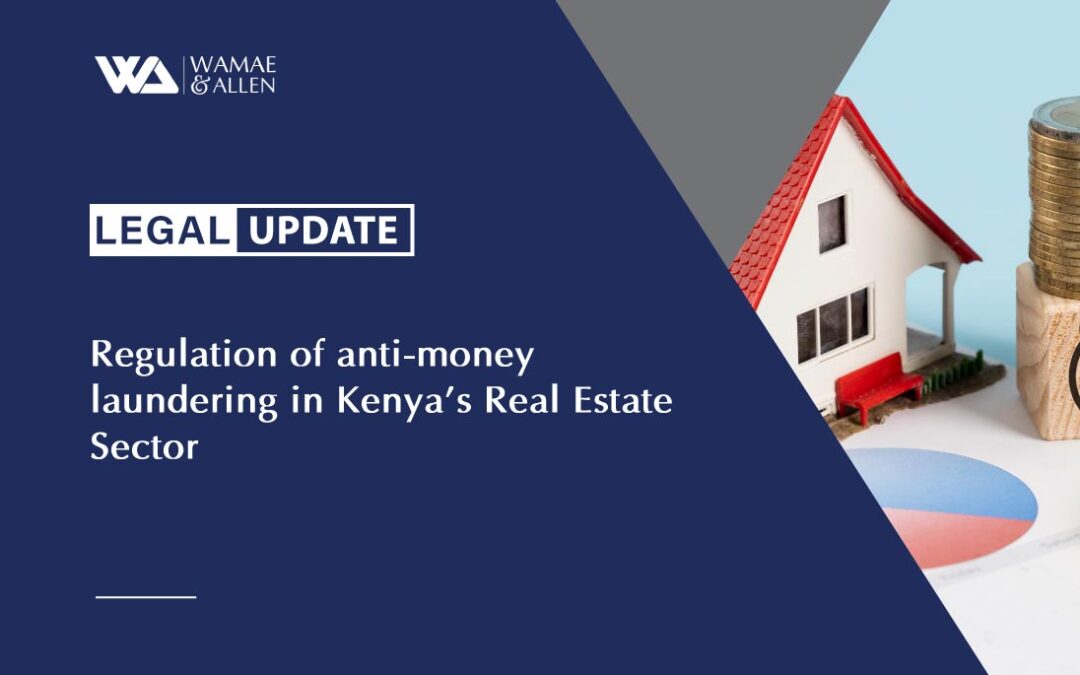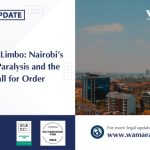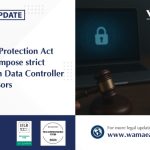A. INTRODUCTION
- Anti-money laundering (AML) regulations are important in preventing the flow of illicit funds in various sectors of the economy, including real estate. The real estate sector in Kenya has been a target for money laundering activities due to the large sums of money involved in property transactions.
- Kenya’s real estate sector is a significant contributor to the country’s economy, accounting for approximately 7.5% of the country’s GDP. However, like many other real estate markets across the world, it is susceptible to money laundering and terrorist financing activities. To combat these illicit activities, Kenya has put in place Anti-Money Laundering (AML) regulations to ensure that real estate transactions are conducted in a transparent and accountable manner.
B. REGULATORY BODIES AND KEY PLAYERS
-
- The regulatory bodies responsible for anti-money laundering in Kenya’s real estate market include the Financial Reporting Centre (FRC), the Capital Markets Authority (CMA), the Central Bank of Kenya (CBK), and the Real Estate Regulatory Authority (RERA).
- The Financial Reporting Centre (FRC) was established under the Proceeds of Crime and Anti-Money Laundering Act (POCAMLA) of 2009 to receive, analyse, and disseminate financial information to law enforcement agencies, supervisory bodies, and other relevant authorities. The FRC is also responsible for monitoring and supervising compliance with AML laws and regulations.
- The Capital Markets Authority (CMA) is responsible for regulating the capital markets in Kenya. This includes the oversight of real estate investment trusts (REITs), which are used to invest in the real estate sector. The CMA is also responsible for supervising the activities of the Nairobi Securities Exchange (NSE), which provides a platform for trading REITs.
- The Central Bank of Kenya (CBK) is responsible for regulating and supervising financial institutions in Kenya. These include commercial banks, microfinance institutions, and other financial service providers. The CBK is also responsible for issuing guidelines and regulations on AML and counter-terrorist financing (CTF) to these institutions.
- The Real Estate Regulatory Authority (RERA) was established under the Real Estate Act of 2016 to regulate the real estate sector in Kenya. This includes the oversight of real estate agents, developers, and property managers. RERA is responsible for ensuring compliance with AML laws and regulations in the real estate sector.
- The key players in the regulation of anti-money laundering in Kenya’s real estate market include financial institutions, real estate developers, real estate agents, property managers, and law enforcement agencies.
- Financial institutions, including commercial banks and microfinance institutions, are responsible for implementing AML and CTF measures in their operations. This includes customer due diligence, monitoring of transactions, and reporting suspicious transactions to the FRC.
- Real estate developers are responsible for ensuring that their projects comply with AML laws and regulations. This includes conducting due diligence on their clients and ensuring that their transactions are legitimate.
- Real estate agents and property managers are responsible for ensuring that their clients comply with AML laws and regulations. This includes conducting due diligence on their clients, monitoring transactions, and reporting suspicious transactions to the FRC.
- Law enforcement agencies, including the police and the Directorate of Criminal Investigations (DCI) are responsible for investigating and prosecuting cases of money laundering in the real estate sector.
C. CASE STUDY
- In 2016, the Kenyan government introduced new regulations requiring all real estate transactions to be conducted through banks or other financial institutions. The move was aimed at promoting transparency and accountability in the real estate sector and preventing the use of cash to finance real estate transactions.
- The regulations have since been amended to require all real estate transactions exceeding Kshs. 1 million to be conducted through banks. Additionally, all financial institutions are required to report any suspicious transactions to the Financial Reporting Centre (FRC), Kenya’s financial intelligence unit responsible for receiving, analysing, and disseminating information relating to money laundering and terrorist financing.
- Applying the said regulations, the FRC fined a Kenyan real estate firm Kshs. 5 million in 2021 for failure to report suspicious transactions to the authority. The firm had received Kshs. 1.4 billion in cash from a client, which it failed to report to the FRC. The FRC’s investigation revealed that the client had a history of suspicious transactions, including transfers from offshore accounts.
- The above case highlights the importance of AML regulations in the real estate sector and the need for all real estate players to comply with the regulations. Real estate agents, developers, and property managers are required to register with the Real Estate Regulatory Authority (RERA), which is also responsible for licensing developers and property managers.
- Additionally, the case demonstrates the importance of reporting suspicious transactions to the FRC. Failure to report such transactions can result in severe penalties, including fines and imprisonment. The FRC’s investigation also highlights the need for real estate players to conduct proper due diligence on clients, including verifying their identities and sources of funds.
- Another case involved the purchase of a property in Nairobi’s upmarket Karen estate in 2016 valued at USD $3 million. The purchase of the property raised suspicions about money laundering and corruption leading to an investigation by Kenya’s anti-money laundering agency, the Financial Reporting Centre (FRC).
- According to FRC, the money used was obtained through corruption and other illegal activities to purchase the property. The investigation found out that there was a failure in disclosing the source of funds and also the FRC discovered that a shell company registered in a tax haven was used to purchase the property thus concealing the ownership of the property. The shell company was used to transfer funds from offshore accounts making it difficult for the authorities to trace the source of ownership. The investigation by the FRC led to the freezing of the property, pending further investigations. The case is still ongoing.
D. COMPARATIVE ANALYSIS
I. South Africa
- South Africa has implemented strict AML regulations aimed at the real estate sector. The Financial Intelligence Centre (FIC) is responsible for supervising and monitoring compliance with AML laws and regulations. Real estate agents are required to register with the FIC and conduct due diligence on their clients. They are also required to report any suspicious transactions to the FIC.
II. United States
- The United States has implemented strict AML regulations aimed at the real estate sector. The Financial Crimes Enforcement Network (FinCEN) is responsible for supervising and monitoring compliance with AML laws and regulations. Real estate agents are required to register with FinCEN and conduct due diligence on their clients. They are also required to report any suspicious transactions to FinCEN. The BSA also requires real estate professionals to implement AML compliance programs, including customer due diligence and ongoing monitoring.
E. CHALLENGES AND RECOMMENDATIONS
- The regulation of anti-money laundering (AML) in Kenya’s real estate market faces several challenges. These challenges stem from the nature of the real estate market, the level of awareness of AML regulations, and the regulatory framework in place. In this article, we will discuss the challenges and recommendations for the regulation of AML in Kenya’s real estate market.
I. Challenges
- High-Value Transactions: The real estate market in Kenya involves high-value transactions, making it an attractive target for money launderers. Criminals use the sector to hide their illicit proceeds by investing in high-end properties, which they can later sell or lease.
- Weak Regulatory Framework: The regulatory framework for AML in Kenya’s real estate sector is weak. The sector lacks a comprehensive AML policy, which leaves a gap that criminals can exploit. The regulatory bodies that oversee the sector also have limited resources and capacity to monitor the market effectively. For example, the regulatory framework in Kenya’s real estate sector is fragmented with different government agencies responsible for various aspects of the industry.
- Lack of Awareness: Many players in the real estate sector, including agents and developers, lack awareness of AML regulations. This makes them vulnerable to criminal activities, such as money laundering and terrorist financing. For example, most real estate agents lack awareness of the AML policies thus cannot easily suspect suspicious activities.
- Limited Coordination: The coordination between regulatory bodies and law enforcement agencies is limited. This leads to a lack of information sharing and cooperation, which hinders the effective regulation of AML in the sector.
II. Recommendations
- Implement Comprehensive AML Policies: The Kenyan government should implement comprehensive AML policies that cover the entire real estate sector. The policies should include measures such as customer due diligence, transaction monitoring, and reporting of suspicious transactions.
- Enhance Regulatory Oversight: The regulatory bodies that oversee the real estate sector should be adequately resourced and capacitated to monitor the market effectively. They should also collaborate with law enforcement agencies to share information and intelligence on criminal activities in the sector.
- Increase Awareness: The government should launch awareness campaigns to educate players in the real estate sector on AML regulations. This will enable them to identify and report suspicious transactions, thereby reducing the risk of money laundering.
- Strengthen Information Sharing: The regulatory bodies and law enforcement agencies should strengthen their coordination and information-sharing mechanisms. This will enhance their ability to identify and investigate cases of money laundering in the sector.
- Strengthen Penalties: The government should increase penalties for money laundering in the real estate sector including higher fines and longer prison sentences. This will act as a deterrent to criminals and reduce the likelihood of money laundering in the sector.
- The regulation of anti-money laundering in Kenya’s real estate market faces several challenges. These challenges are mainly due to the nature of the sector, weak regulatory framework, lack of awareness, and limited coordination. To address these challenges, the government should implement comprehensive AML policies, enhance regulatory oversight, increase awareness, strengthen information sharing, and strengthen penalties for money laundering. By implementing these recommendations, Kenya can reduce the risk of money laundering and enhance the integrity of its real estate market.
J. CONCLUSION
- The case study of AML regulations in Kenya’s real estate sector highlights the importance of promoting transparency and accountability in real estate transactions. Real estate players are required to comply with AML regulations, including conducting due diligence on clients and reporting suspicious transactions to the FRC. Failure to comply with these regulations can result in severe penalties, including fines and imprisonment. As Kenya’s real estate sector continues to grow, it is essential to maintain the integrity of the sector by promoting transparency and accountability.
This article is provided free of charge for information purposes only; it does not constitute legal advice and should be relied on as such. No responsibility for the accuracy and/or correctness of the information and commentary as set in the article should be held without seeking specific legal advice on the subject matter. If you have any query regarding the same, please do not hesitate to contact Real Estate & Securitization Department at conveyancingWA@wamaeallen.com
 Loading...
Loading...
About the author
Preston Ndombi Wawire is an experienced litigator of over 10 years standing and has perfected his art in civil and commercial litigation. He has vast experience in banking and recoveries litigation, insurance and malpractice law, and securities enforcement. Prestone has been involved in some of the most ground breaking litigation in injunctive matters and medical malpractice. Prestone is an active member of the Law Society of Kenya, Environment and Land Court Bar Bench Committee.
- Prestone Wawirehttps://wamaeallen.com/author/prestone/
- Prestone Wawirehttps://wamaeallen.com/author/prestone/
- Prestone Wawirehttps://wamaeallen.com/author/prestone/
- Prestone Wawirehttps://wamaeallen.com/author/prestone/











